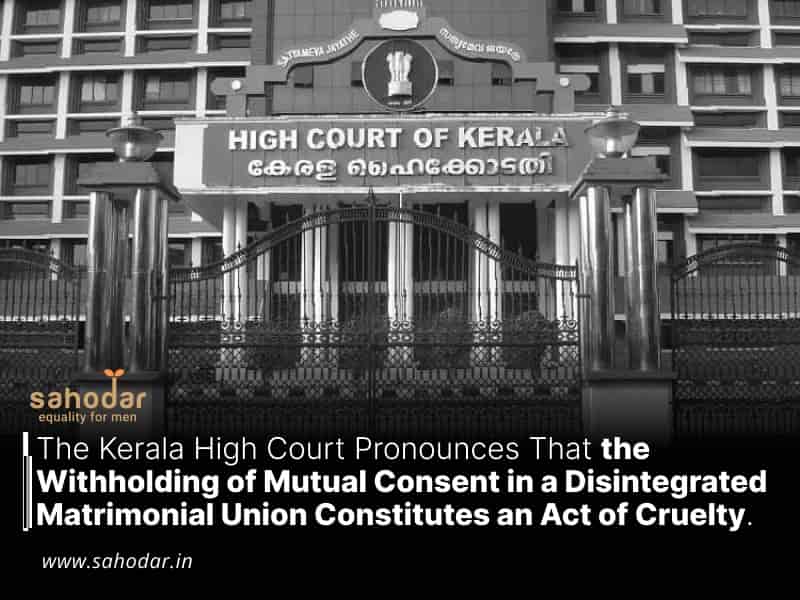In a recent divorce case, the Kerala High Court rendered a judgment asserting that the act of withholding mutual consent within a failed marriage amounts to an act of cruelty. The case pertained to a matrimonial appeal filed by the husband, who had previously been unsuccessful in obtaining a divorce based on cruelty in the Family Court.
A Division Bench comprising Justice A. Muhamed Mustaque and Justice Sophy Thomas observed, “The court rooms cannot be replaced to allow the parties for a battle for grooming their egos and idiosyncratic behaviour. The Court is established for genuine people who honestly dispute on the cause. If they cannot live together even by sharing residence for more than a decade, it can be presumed that sense is lost on both. The idea of no fault divorce is making the people to realise that there is a sensible way of parting on a mutually agreed terms. Withholding mutual consent in a failed marriage is nothing but cruelty.”
Advocate P. Narayanan acted as legal counsel for the appellant, the husband, while Advocate G. Sreekumar (Chelur) represented the respondent, the wife, in the matter at hand. This case pertains to a marital union conducted in accordance with Hindu customs, resulting in the birth of two offspring during the matrimonial relationship. The appellant, formerly residing in Muscat, returned to India and lodged allegations asserting that the respondent, originating from an economically disadvantaged background, exhibited a predominant interest in obtaining financial resources from him. It was asserted that the funds remitted from Muscat by the appellant were consistently misappropriated, inclusive of those earmarked for the construction of a dwelling. Furthermore, the appellant accused the respondent of engaging in an extramarital liaison with the husband of her sister. The appellant contended that neglect and emotional detachment from him constituted acts of cruelty, as delineated in his divorce petition. Additionally, he alleged that familial discord arose when a dispute emerged between the respondent’s family and the widow of the respondent’s brother, and he aligned himself with the latter’s position. The respondent vehemently refuted all allegations of cruelty made by the appellant, precipitating the adjudication of the matter by the court.
In light of the aforementioned circumstances, the High Court took cognizance, remarking, “It is apparent that this dispute appears motivated not by justifiable reasons but rather by the desire to preserve personal pride and exact retribution against the other spouse. A recent pronouncement by the Supreme Court (Civil Appeal No.5454 of 2023, 2023 Live Law sc 727) underscored that compelling a couple to persist in their matrimonial alliance despite an irremediable breakdown is tantamount to cruelty inflicted upon both parties.” Consequently, the Court decreed in favor of the divorce, yet mandated the appellant to disburse a sum of Rs. 10 Lakhs as enduring alimony to the respondent and convey 10 cents of land to her.
“The appellant-husband is directed to produce the sketch earmarking the ten cents of land within a period of one week. The respondent shall signify before this Court regarding her willingness to accept the 10 cents of land offered by her husband within a further period of one week”, further directed the Court. Accordingly, the High Court allowed the appeal.

